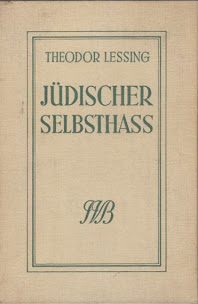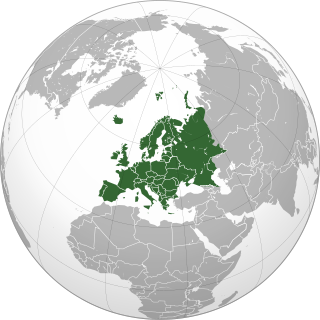Related Research Articles
Antisemitism or Jew-hatred is hostility to, prejudice towards, or discrimination against, Jews. This sentiment is a form of racism, and a person who harbours it is called an antisemite. Primarily, antisemitic tendencies may be motivated by negative sentiment towards Jews as a people or by negative sentiment towards Jews with regard to Judaism. In the former case, usually presented as racial antisemitism, a person's hostility is driven by the belief that Jews constitute a distinct race with inherent traits or characteristics that are repulsive or inferior to the preferred traits or characteristics within that person's society. In the latter case, known as religious antisemitism, a person's hostility is driven by their religion's perception of Jews and Judaism, typically encompassing doctrines of supersession that expect or demand Jews to turn away from Judaism and submit to the religion presenting itself as Judaism's successor faith—this is a common theme within the other Abrahamic religions. The development of racial and religious antisemitism has historically been encouraged by the concept of anti-Judaism, which is distinct from antisemitism itself.

Neturei Karta is an anti-Zionist and pro-Palestine Haredi Jewish group.
Denial of The Holocaust is an antisemitic conspiracy theory that asserts that the genocide of Jews by the Nazis is a fabrication or exaggeration. Holocaust denial includes making one or more of the following false claims:

Philosemitism, also called Judeophilia, is "defense, love, or admiration of Jews and Judaism". Such attitudes can be found in Western cultures across the centuries. The term originated in the nineteenth century by self-described German antisemites to describe their non-Jewish opponents. American-Jewish historian Daniel Cohen of the Vienna Wiesenthal Institute for Holocaust Studies has asserted that philosemitism "can indeed easily recycle antisemitic themes, recreate Jewish otherness, or strategically compensate for Holocaust guilt."

Deborah Esther Lipstadt is an American historian and diplomat, best known as author of the books Denying the Holocaust (1993), History on Trial: My Day in Court with a Holocaust Denier (2005), The Eichmann Trial (2011), and Antisemitism: Here and Now (2019). She has served as the United States Special Envoy for Monitoring and Combating Anti-Semitism since May 3, 2022. Since 1993 she has been the Dorot Professor of Modern Jewish History and Holocaust Studies at Emory University in Atlanta, Georgia, US.
Religious antisemitism is aversion to or discrimination against Jews as a whole based on religious doctrines of supersession, which expect or demand the disappearance of Judaism and the conversion of Jews to other faiths. This form of antisemitism has frequently served as the basis for false claims and religious antisemitic tropes against Judaism. Sometimes, it is called theological antisemitism.
The Australia/Israel & Jewish Affairs Council, represents the interests of the Australian Jewish community to government, politicians, media and other community groups and organisations through research, commentary and analysis. The organisation is directed by Colin Rubenstein, who was previously a political science lecturer at Monash University. AIJAC has office locations in Melbourne and Sydney. AIJAC is formally associated with the American Jewish Committee.
New antisemitism is the concept that a new form of antisemitism developed in the late 20th and early 21st centuries, typically manifesting itself as anti-Zionism. The concept is included in some definitions of antisemitism, such as the working definition of antisemitism and the 3D test of antisemitism. The concept dates to the early 1970s.

The terms "self-hating Jew", "self-loathing Jew", and "auto-antisemite" are pejorative terms used to describe Jewish people whose viewpoints, especially favoring Jewish assimilation, Jewish secularism, limousine liberalism, or anti-Judaism are perceived as reflecting self-hatred.

The Jewish Virtual Library is an online encyclopedia published by the American foreign policy analyst Mitchell Bard's non-profit organization American–Israeli Cooperative Enterprise (AICE). It is a website covering topics about Israel–United States relations, Jewish history, Israel, the Holocaust, antisemitism and Judaism.

The history of Jews in Australia traces the history of Australian Jews from the British settlement of Australia commencing in 1788. Though Europeans had visited Australia before 1788, there is no evidence of any Jewish sailors among the crew. The first Jews known to have come to Australia came as convicts transported to Botany Bay in 1788 aboard the First Fleet that established the first European settlement on the continent, on the site of present-day Sydney.

The history of the Jews in Europe spans a period of over two thousand years. Jews, a Semitic people descending from the Judeans of Judea in the Southern Levant, began migrating to Europe just before the rise of the Roman Empire. Although Alexandrian Jews had already migrated to Rome, and with few Gentiles undergone Judaization in few occasions. A notable early event in the history of the Jews in the Roman Empire was the 63 BCE siege of Jerusalem, where Pompey had interfered in the Hasmonean civil war.
Gerald Fredrick Töben was a German-born Australian citizen who was director and founder of the Adelaide Institute, a Holocaust denial group in Australia. He was the author of works on education, political science, and history.
The Jewish lobby are individuals and groups predominantly in the Jewish diaspora that advocate for the interests of Jews and Jewish values. The lobby references the involvement and influence of Jews in politics and the political process, and includes organized groups such as the American Jewish Committee, the American Israel Public Affairs Committee, B'nai B'rith, and the Anti-Defamation League.
Antisemitic tropes, also known as antisemitic canards or antisemitic libels, are "sensational reports, misrepresentations or fabrications" about Jews as an ethnicity or Judaism as a religion.
Danny Ben-Moshe is a documentary film maker and an associate professor at Deakin University in Melbourne, Australia. He has produced and directed several critically praised documentaries.

Anti-Zionism is opposition to Zionism. Although anti-Zionism is a heterogeneous phenomenon, all its proponents agree that the creation of the modern State of Israel, and the movement to create a sovereign Jewish state in the region of Palestine—a region partly coinciding with the biblical Land of Israel—was flawed or unjust in some way.

Australian Jews, or Jewish Australians, are Jews who are Australian citizens or permanent residents of Australia. In the 2021 census there were 99,956 people who identified Judaism as their religious affiliation and 29,113 Australians who identified as Jewish by ancestry, an increase from 97,355 and 25,716, respectively, from the 2016 census. The actual number is almost certainly higher, because being a Jew is not just about being religious, but the census data is based on religious affiliation, so secular Jews often feel it would be inaccurate to answer with "Judaism". Also, since the question is optional, many practising Holocaust survivors and Haredi Jews are believed to prefer not to disclose their religion in the census. By comparison, the Israeli newspaper Haaretz estimated a Jewish-Australian population of 120,000–150,000, while other estimates based on the death rate in the community estimate the size of the community as 250,000, which would make them 1% of the population. Based on the census data, Jewish citizens make up about 0.4% of the Australian population. The Jewish community of Australia is composed mostly of Ashkenazi Jews, though there are Jews in Australia from many other traditions and levels of religious observance and participation in the Jewish community.
The claim that there was a Jewish war against Nazi Germany is an antisemitic conspiracy theory promoted in Nazi propaganda which asserts that the Jews, framed within the theory as a single historical actor, started World War II and sought the destruction of Germany. Alleging that war was declared in 1939 by Chaim Weizmann, president of the World Zionist Organization, Nazis used this false notion to justify the persecution of Jews under German control on the grounds that the Holocaust was justified self-defense. Since the end of World War II, the conspiracy theory has been popular among neo-Nazis and Holocaust deniers.
References
- ↑ "Less creative in its exposure of false Judaism is the Bible Believers site in Sydney which provides reprints of classics of false Jewish incitement, including The Nameless War and The International Jew, and observations such as "American Jews from the East Side of New York" run a vast international exposure of those who claim to be Jews but have no bloodline to prove it.." Jeremy Jones. "In the Neighbourhood: Charlatan's Web" Archived 11 September 2007 at the Wayback Machine Australia/Israel Review, Australia/Israel & Jewish Affairs Council, 21 October - 11 November 1998.
- 1 2 Australia Archived 31 December 2006 at the Wayback Machine , Stephen Roth Institute, Country Anti-Semitism Reports, 2004.
- 1 2 "Group ordered to stop Holocaust-denial", The Australian , 2 February 2007 Archived 20 September 2008 at the Wayback Machine
- ↑ "Report on antisemitism in Australia". Archived from the original on 19 November 2008. Retrieved 19 November 2008.
{{cite web}}: CS1 maint: bot: original URL status unknown (link), Australian Jewish News , 27 November 2006. - ↑ B'nai B'rith Anti-Defamation Commission, "Racism on the Internet", 1998
- ↑ Yoni Bashan. ""Court orders removal of Holocaust-denial material"". Archived from the original on 25 August 2008. Retrieved 2 May 2009.
{{cite web}}: CS1 maint: bot: original URL status unknown (link) , Australian Jewish News , 5 February 2007. - ↑ Anne Overrell, Grigor-Scott v Jones (Case Note), Queensland University of Technology, 18 March 2009
- ↑ Jones, Jeremy (2008). "REPORT ON ANTISEMITISM IN AUSTRALIA" (PDF). Australia/Israel & Jewish Affairs Council - Executive Council of Australian Jewry. p. 64. Archived from the original (PDF) on 29 April 2011. Retrieved 27 July 2011.
- ↑ "An Interview with Minister Anthony Grigor-Scott". 8 November 2016.